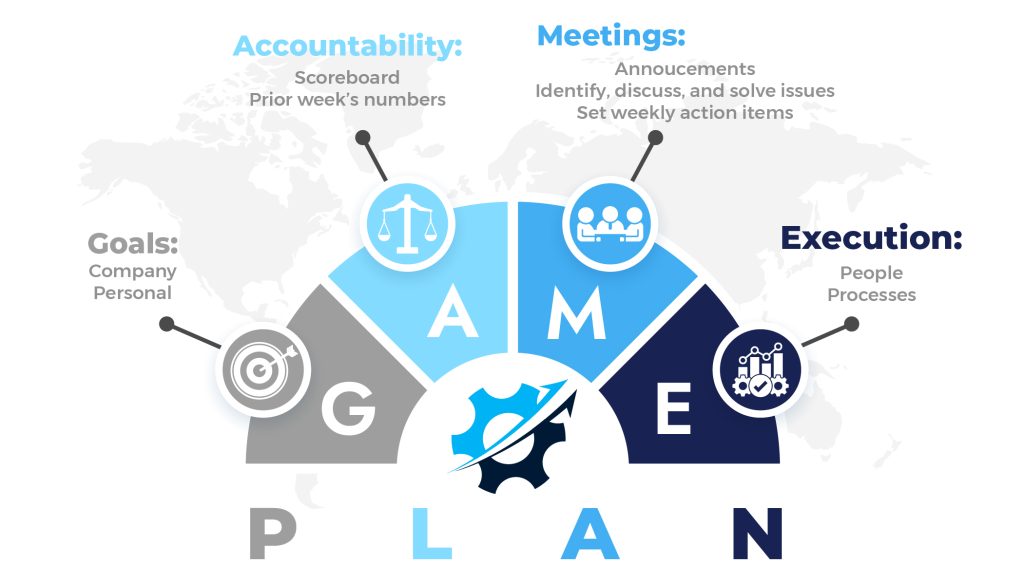It’s the start of a new year and the perfect time to set yourself and your business up for success.
A key to that happening is mastering the skills of Accountability. Mastering the following three critical business accountabilities will help keep your organization on top of its game plan!
What is Accountability in an Organization?
Accountability in the workplace means showing up when you’re supposed to and striving to accomplish what you said you’d do. It’s taking personal responsibility for your own work and giving an account of the events, tasks, and experiences you’ve taken on. It’s how you respond and take ownership of a task’s results.
Accountability is also trusting your teammates and counting on each other to get things done.
Creating accountability within an organization is a critical tool for high-performing teams. It helps eliminate surprises and develop better work relationships. Without accountability systems and accountability standards clearly set in place, employees will struggle to know what’s expected of them and struggle to perform at their full potential.
Three Critical Business Accountabilities
1. KPI Accountability
First and foremost, to achieve success, you have to know your deliverables and be accountable for them. Each division within your business and each key leader needs total clarity on the Key Performance Indicators (KPIs) they are being held accountable to achieve.

Your employees also need a system to hold themselves and others accountable. Create strategic rocks and prioritize them for the week, month, or quarter.
Make these rocks part of your regularly scheduled meetings to stay on top of your business KPIs. Whether this be daily, weekly, or monthly “all-hands.”
KPI accountability also includes reviewing the strategic rocks each leader has committed to quarterly. This regular review will help keep your leaders and your company on track.
2. Peer-to-Peer Accountability
Create an accountability agreement between key managers or leaders. This will help ensure these people support each other, helping the others fulfill their roles on time and accurately.
To help keep everyone on track, conduct a weekly team review where the accountability of these systems is reported. If you don’t need a weekly review, pick a schedule that makes sense for your team.
But stick to the timeframe you choose! Peer-to-peer accountability is about how employees work with one another and how well they follow the systems you’ve put in place.
3. Team Accountability
There’s a reason the motto, “All for one and one for all,” was popular in the novel The Three Musketeers and is still touted in corporate workplaces today. Companies cannot reach greatness without highly effective teamwork.
A group has to support its members, and its members have to support the group.

But a successful team and excellent team accountability is more than just team spirit. It starts with strong personal accountability. You—or the leader of your company—must first hold yourself accountable before initiating accountability conversations with other workers.
You have to commit to candor. You have to be totally open and honest regarding your company’s strategy, goals, performance, and issues, including how you’re stacking up or falling short. You must set yourself to a higher standard and keep dialogue open.
It’s also critical you set clear expectations for all team members. A lack of specificity or unclear expectations creates accountability gaps. So, keep expectations as specific as possible.
- Define project ownership. Clearly define who owns what. Clarify who is responsible for, accountable to, consulted with, and informed on the work.
- Use a detailed project spec template for deliverables: Project specs help teams clearly define expectations and eliminate potential accountability gaps.
- Get intentional with action items in team meetings. Action items build accountability. Don’t let them slip through the cracks when they come up in meetings. Assign a notetaker to document action items as you go through the meeting, and share the information immediately with the team once the meeting wraps up.
- Publicize the roles and responsibilities of everyone on your team and revisit expectations regularly. When employees know their role, they’re more likely to feel ownership and take charge of their work. And when teammates understand other people’s roles, it strengthens trust, communication, and collaboration.
Remember! Be hard during the process while always inspiring your people—your team will rise to the challenge and deliver greatness!
Interested in how Ready Business Systems can help you?
Need help with business accountabilities? For more information about the services Ready Business Systems offers and how we can effectively help grow your business, call us at 1-800-485-1404 or visit our Contact page.



